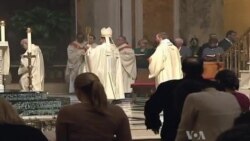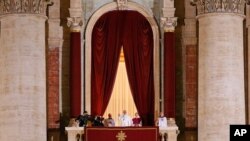WASHINGTON —
The selection of a Jesuit priest from Argentina to be pope signifies a number of firsts, but Pope Francis is expected to continue the doctrinal conservatism of the last two papacies.
"What a glorious thing. What a wonderful thing. First American pope. He's the first pope who is a Jesuit. The first pope from the southern Hemisphere," said Rev. Barry Knestout, auxiliary bishop of Washington, at the Cathedral of St. Matthew the Apostle in Washington D.C.
As archbishop of Buenos Aires, Jorge Bergoglio was known for his humility - it is said he cooked his own food and rode public buses.
Across Washington, the National Shrine of the Immaculate Conception was draped in the Vatican's colors. And Rev. Mark Morozowich said the pope's new name carries meaning.
"By choosing the name Francis - Francis I! - You know Francis was a man very committed to prayer and to poverty. And as well we know that Francis sought to reform the church," said Rev. Mark Morozowich, of the Catholic University of America.
Francis referred to himself in his first papal speech as the choice from "the end of the earth."
But his selection is not as radical as it may seem, says Chester Gillis, a dean at Georgetown University, a Jesuit institution.
"As much as he's in Latin America and Buenos Aires, he knows Rome and he's on lots of the congregations. He's fluent in Italian and he's there a lot. He knows the players, so he's not some unknown quantity which people might think," he said.
He expects Francis will be a pope in the mold of his predecessors.
"Theologically conservative. Doctrinally conservative. No question. I don't see any changes there," he explained.
But his election is a recognition by a historically European church that its future is where most of the world's 1.2 billion Catholics are - in the southern hemisphere.
"What a glorious thing. What a wonderful thing. First American pope. He's the first pope who is a Jesuit. The first pope from the southern Hemisphere," said Rev. Barry Knestout, auxiliary bishop of Washington, at the Cathedral of St. Matthew the Apostle in Washington D.C.
As archbishop of Buenos Aires, Jorge Bergoglio was known for his humility - it is said he cooked his own food and rode public buses.
Across Washington, the National Shrine of the Immaculate Conception was draped in the Vatican's colors. And Rev. Mark Morozowich said the pope's new name carries meaning.
"By choosing the name Francis - Francis I! - You know Francis was a man very committed to prayer and to poverty. And as well we know that Francis sought to reform the church," said Rev. Mark Morozowich, of the Catholic University of America.
Francis referred to himself in his first papal speech as the choice from "the end of the earth."
But his selection is not as radical as it may seem, says Chester Gillis, a dean at Georgetown University, a Jesuit institution.
"As much as he's in Latin America and Buenos Aires, he knows Rome and he's on lots of the congregations. He's fluent in Italian and he's there a lot. He knows the players, so he's not some unknown quantity which people might think," he said.
He expects Francis will be a pope in the mold of his predecessors.
"Theologically conservative. Doctrinally conservative. No question. I don't see any changes there," he explained.
But his election is a recognition by a historically European church that its future is where most of the world's 1.2 billion Catholics are - in the southern hemisphere.






